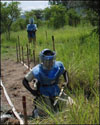
Nineteen out of the 25 states in southern Sudan are still littered by landmines from the 22-year civil war that ended in 2005. Efforts are now underway to clear the most densely mined areas – a process critical to enabling displaced populations to return home, humanitarian aid to be dispersed, and peacekeeping forces to fully deploy, sources quoted in a recent report by IRIN indicated.
The Sudan People’s Liberation Army, or SPLA, and the Sudan Armed Forces planted the mines and other unexploded devices heavily on key battlefields, which now host the deadly remnants of the war.
Malakal, Upper Nile State, is one town where de-mining teams are focusing efforts. Teams have covered about 1.3 million square miles of mined land, uncovering and destroying over 526 anti-personnel mines, but 1.5 million square miles remain. Doep du Plessis, a U.N. Mine Action (UNMAO) officer in Malakal, explained that the town is the “highest priority” because of the concentration of landmines and their potentially deadly placement.
"The town is in the minefield. We find mines inside the houses… many people are not aware that they have a mine on their doorstep."
The mines are primarily made of plastic and are difficult to detect; de-mining teams ease over landmine fields with metal detectors, listening for a solid beeping sound that pinpoints buried metal components of the deadly devices. De-mining efforts are constricted by the season: "In the dry season the soil is so compacted that you cannot activate a mine. During the wet season, you step on it and pop, it goes,” Plessis noted.
Currently, Norwegian People’s Aid has eight teams working to clear the mines in southern Sudan. Two of the teams are all-women, which the BBC recently profiled. The report describes the conditions in which the teams work:
"Each de-miner creeps painstakingly forward down thin alleys, moving the safety line forward only once every section has been checked.
It is tough work in baking sun, and the plastic face-shields they wear inside the minefield mean that it is not possible to drink water during each 45-minute shift."
A woman quoted by the BBC summed up the importance of the job, despite the inherent risks, and took the opportunity to tout the success of the all-women teams:
"Some say it is dangerous for a woman, but they are jealous because we are doing the same job as the men. What is dangerous is leaving mines hidden in the ground."
Laura Heaton contributed to this post.
Photo: A woman on a de-mining team works cautiously. Via BBC

